Some sales professionals swear by artificial intelligence tools. Others are more weary of them and worry they’ll replace the necessary human touch involved in building customer relationships. Whatever your feelings are towards AI for sales, the technology is here to stay.
AI sales tools and platforms are actually making it easier for reps to close more sales and work more productively, and software today is more advanced and reliable than ever. Of course, AI isn’t here to replace sales representatives, but rather take over mundane tasks like admin work and data entry so that sales agents can focus on what they do best: selling.
This blog will look at how AI is used in sales today and how different CRM platforms like monday CRM are using advanced AI sales technology to allow sales teams to work smarter. We’ll also introduce you to some examples of companies that have used AI in their sales processes and seen significant boosts in sales and productivity.
Try monday CRMWhat is AI for sales?
Sales teams are turning to AI technologies to improve several different workflows, from automating sales processes to identifying selling opportunities, and even helping with sales prospecting and communication.
AI software mimics human cognitive abilities to perform complex sales tasks such as decision-making, data analysis, and language translation.
It can use human-like reasoning and machine learning to improve performance and productivity while handling a lot of manual, redundant tasks that take up a lot of sales agents’ time.
How is AI for sales used in practice?
There are a lot of different ways AI can help in the sales process. Not every team needs to rely on AI for every sales touchpoint or procedure, but there are multiple AI-driven technologies and platforms that can streamline tasks and help teams work quicker and smarter. Here are some of the key ways AI is being used in sales today:
- Prospecting: AI analyzes huge datasets to identify and qualify high-potential prospects, helping sales teams focus on leads most likely to convert
- Conversational AI: AI-powered chatbots and virtual assistants engage with leads in real time, answer questions, schedule meetings, and guide buyers through the sales funnel
- Sales forecasting: AI can predict future sales trends by analyzing historical data, market conditions, and customer behavior to help businesses make informed decisions
- Lead generation and management: AI automates lead capture, scoring, and enrichment by analyzing user intent, online behavior, and engagement data to deliver high-quality leads
- Sales training and enablement: Sales coaching tools powered by AI can help sales leaders analyze sales calls, emails, and team performance to provide personalized training and actionable insights
- B2B sales: AI streamlines complex B2B sales cycles by automating outreach and follow-ups, analyzing deal progress, and identifying tailored engagement strategies for key accounts
- Sentiment analysis: AI can detect user sentiment in calls and emails by analyzing speech patterns and context to optimize messaging and stay on top of potential service issues
- Generative AI: Craft compelling and personalized messaging and sales content with AI, streamlining communications and asset creation
Benefits of using AI for sales processes
Even though AI has proven to help teams work more efficiently, a lot of sales teams have yet to adopt meaningful AI platforms. According to monday.com’s World of Work report, sales teams demonstrated some of the lowest adoption rates, just 51%, of AI technology compared to their counterparts in other departments like IT, marketing, or finance.
This could be due to the fact that sales roles are more customer-facing and the risk involved in AI mistakes is greater. Still, when used correctly, the benefits of AI in sales far outweigh the potential risks.
Boost productivity
Thanks to AI, sales teams can work more productively, leaving repetitive tasks to AI platforms while they focus on nurturing leads and closing sales. With AI on hand to summarize meetings, fill in missing details on new leads, score incoming prospects, and generate sales reports, your agents can spend more time selling.
Get real-time insights with sales forecasting
In sales, forecasting is an essential tool, but it’s not always accurate. AI sales platforms can look at historical data and past performance and merge it with market trends to provide targeted sales forecasts that are accurate and reliable.
Save time with automation
According to the LinkedIn State of Sales report, sales reps spend over one-third of their time updating CRMs and on other administrative tasks (19% each). Rather than manually entering CRM or customer data and constantly updating the statuses of leads in a pipeline, AI can do all the heavy lifting for you. Sales reps can save time on tasks like scheduling meetings, data entry, and pipeline management and instead focus on more high-value sales activities.
Learn how to use monday.com automations to eliminate manual tasks and streamline your workflows — with a short lesson in monday academy. Take monday’s automations 101 course.
Send tailored communications
Generative AI can be used to send tailored communications and follow-ups to leads and customers at the right time. Agents no longer need to manually write each email or use generic templates but can rely on AI to craft targeted messages that relate to every lead and customer for smoother and more regular communication.
Personalize the customer experience
Sales are highly personal, but it’s not always easy for sales reps to personalize each and every customer experience. AI can be used to get personalized recommendations for every prospect and customer based on real-time data, improving customer satisfaction rates.
5 of the best software powering sales with AI
There are a lot of different AI tools and platforms out there that can help with everything from generating emails to automating lead data capturing or personalizing sales videos. However, to get the most out of AI, it’s worth using software that encompasses tons of AI-powered sales functionalities.
CRMs make it possible for sales teams to use AI to generate reports, gain deep insights, track sales forecasts, automatically score and nurture leads, and more. For a more detailed breakdown of AI sales software, check out our roundup of the top AI-powered CRMs on the market.
1. monday CRM
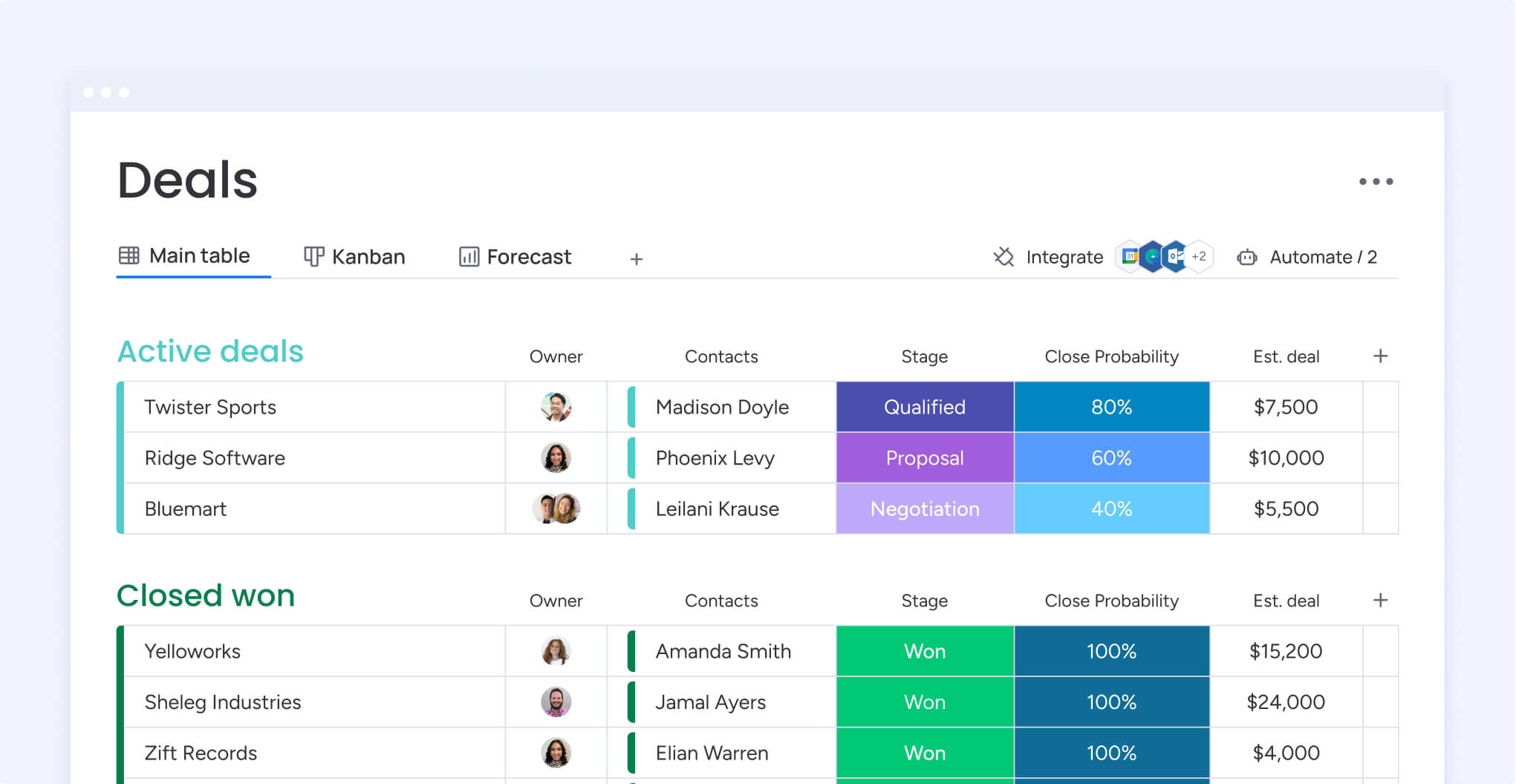
monday CRM provides a highly customizable and intuitive interface for managing leads, sales pipelines, and customer interactions. Its AI capabilities allow users to create powerful automations, streamline workflows, generate emails and sales content, and enhance decision-making with data-driven insights.
- AI-powered automation simplifies lead scoring, task assignments, and follow-ups
- AI email writing generates contextually relevant email responses
- Predictive analytics forecasts sales trends based on historical data
2. HubSpot CRM
HubSpot CRM offers an all-in-one platform for sales, marketing, and customer service, making it ideal for businesses of all sizes. Its AI tools help automate processes, personalize interactions, and improve sales efficiency.
- AI analyzes email responses to suggest the best follow-up actions
- Automated data entry and deal tracking reduce manual workload
- AI-powered sidekicks and agents can reduce manual tasks and interact with customers
3. Salesforce
Salesforce is a powerful CRM with extensive AI-driven features, offering deep sales insights and automation for enterprises. Its AI assistant, Einstein, enhances productivity through predictive analytics and automating tasks.
- AI-powered forecasting predicts revenue trends based on historical data
- Conversational AI powers chatbots and assistants for smarter CRM usage
- AI agents assist in customer interactions and lead engagement
4. Zoho CRM
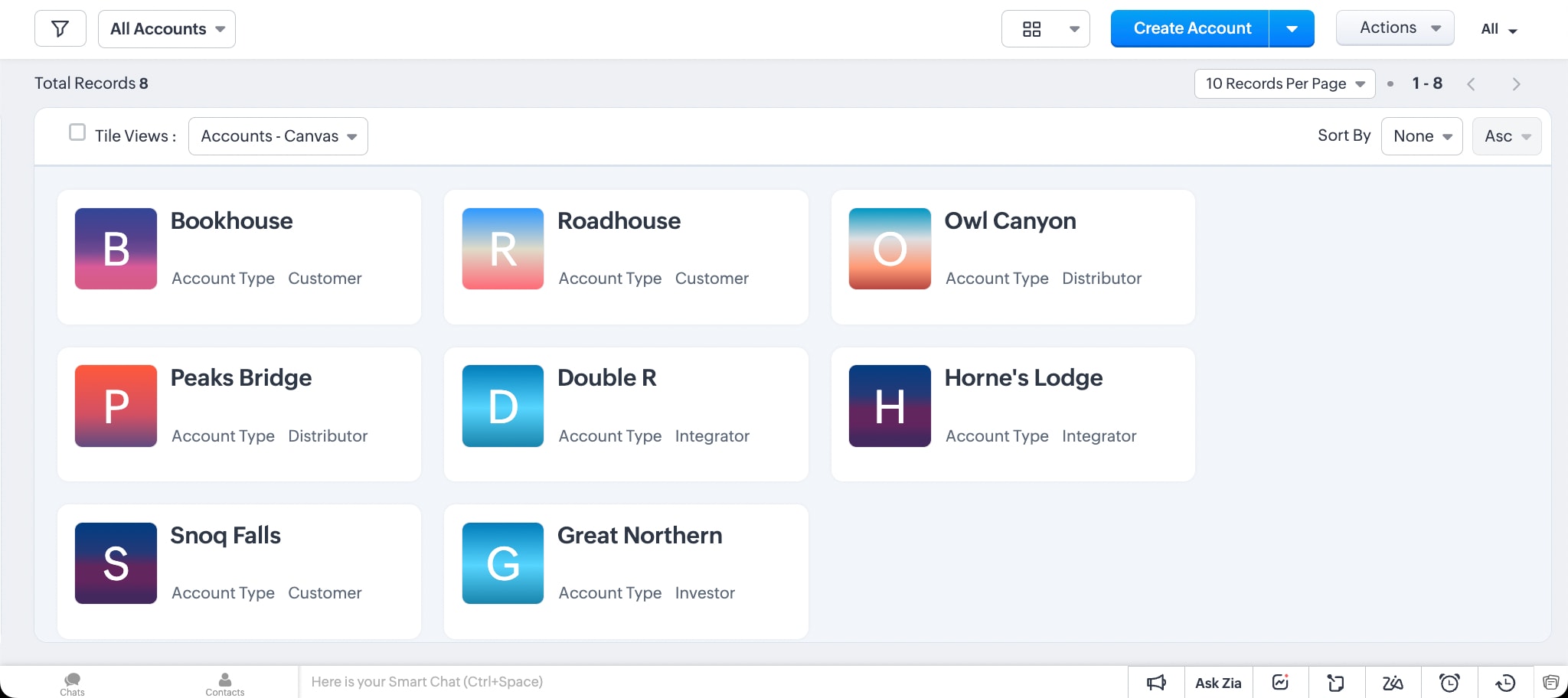
Zoho CRM provides a robust CRM solution with AI-powered tools for sales, automation, and analytics. Zia, Zoho CRM’s AI assistant, helps sales teams make data-driven decisions and streamline workflows.
- Use AI to enrich data on leads and customers in your database
- Interact with the CRM by speech and text commands to quickly access data and reports
- AI-driven suggestions recommend the best time to contact leads
5. Freshsales
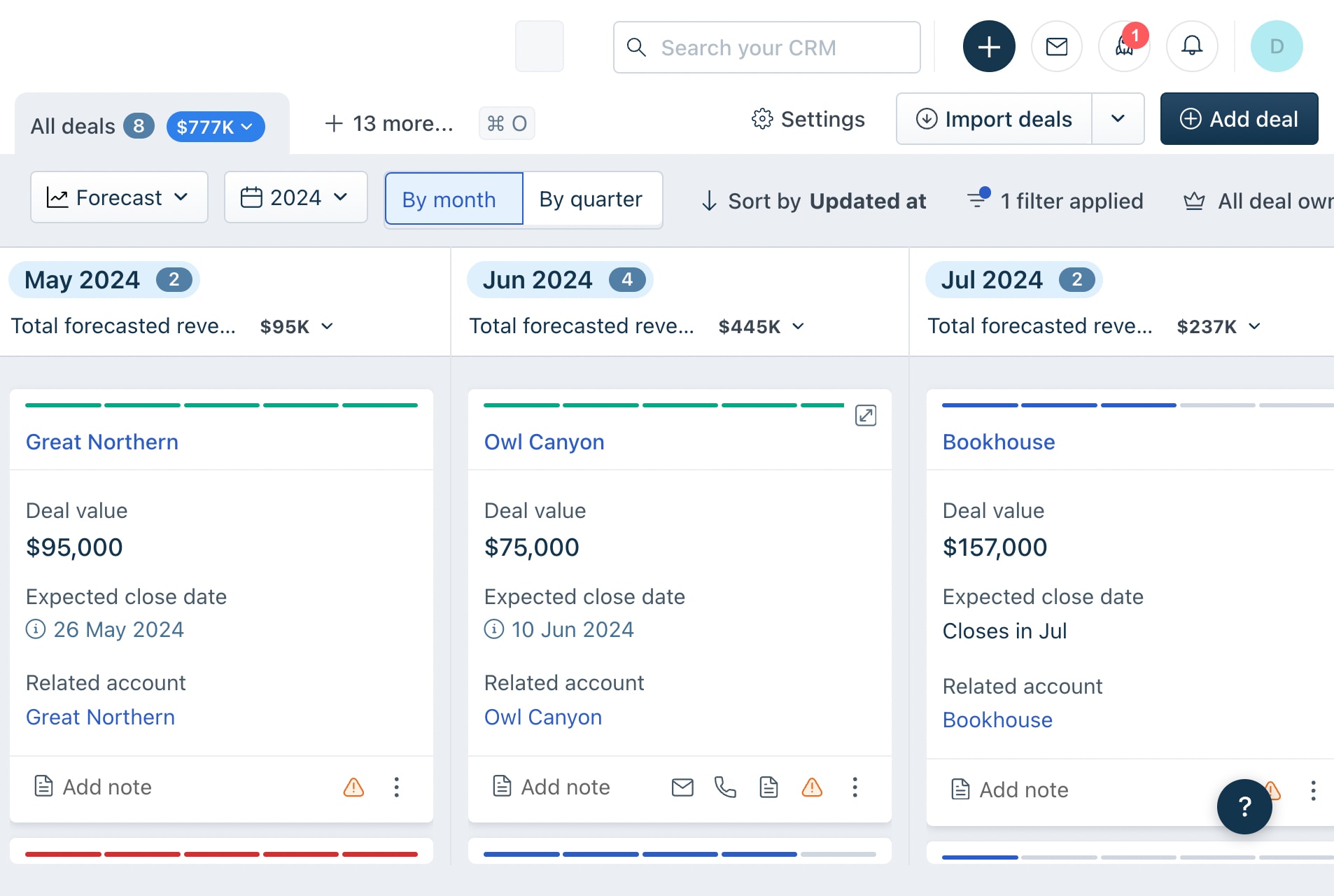
Freshsales by Freshworks offers an AI-powered CRM that helps sales teams simplify lead management and sales automation. Its AI assistant, Freddy, enhances pipeline visibility and helps sales teams close deals faster.
- AI-driven lead tracking qualifies prospects and routes them to the best agent
- An AI writer can personalize outreach emails for every customer
- Get AI-powered recommendations on the next actions for deals in your pipeline
AI for sales vs. marketing: What’s the difference?
While it’s true that there’s a lot of crossover between AI sales tools and AI marketing tools, there are still differences in the way AI is used for both. In sales, AI operates in customer-facing roles, helping with messaging and even direct communication through chatbots. Additionally, AI is also used to generate insights and forecasts, making it essential for data-driven decision-making.
In marketing, AI drives a lot of content creation and campaign management. It analyzes customer behavior, automates ad targeting, and personalizes email marketing messages to improve engagement. There’s a greater focus on predicting customer preferences to refine strategies, encourage more engagement, and inform social media and email campaigns.
While both sales and marketing AI aims to enrich customer interactions and drive conversions, sales AI is more focused on direct engagement and closing deals, while marketing AI emphasizes audience reach and brand positioning.
Closing more sales in less time with monday CRM
Picking the right AI-powered platform for your sales team isn’t a decision that should be made on the spot. You want to carefully consider the AI functionalities your organization needs and look for different platforms that give you the most robust features while still being easy to use. As far as AI sales platforms go, a CRM like monday CRM will give you the most versatility and flexibility to fit AI into your existing processes.
monday CRM is an all-in-one platform that allows busy sales teams to leverage the power of AI to close more deals. With monday CRM, teams can completely customize the format and functionalities of their platform to fit specific workflows, while using AI to power automations, reporting, and personalization.
Here’s a more in-depth look at a few core monday CRM AI features that help sales teams close deals.
Smoother communication with AI-assisted email writing
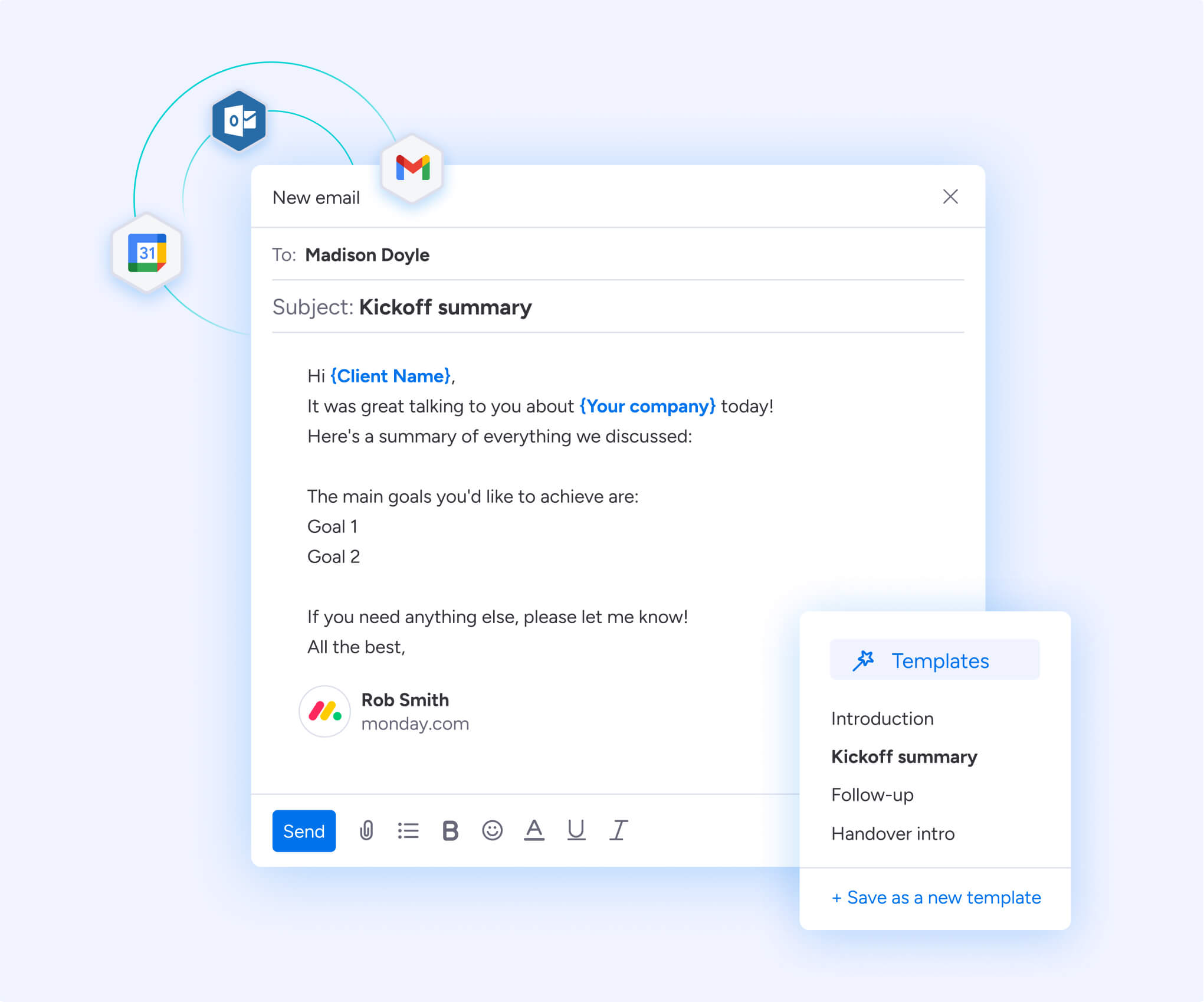
Whether you’re writing directly to one customer or sending mass emails to an entire segment, monday CRM’s AI writer can generate tailored content for each lead and client. Use AI to quickly compose an email or suggest smart templates to make communication quick and painless.
Easily manage leads and detect customer sentiment with AI
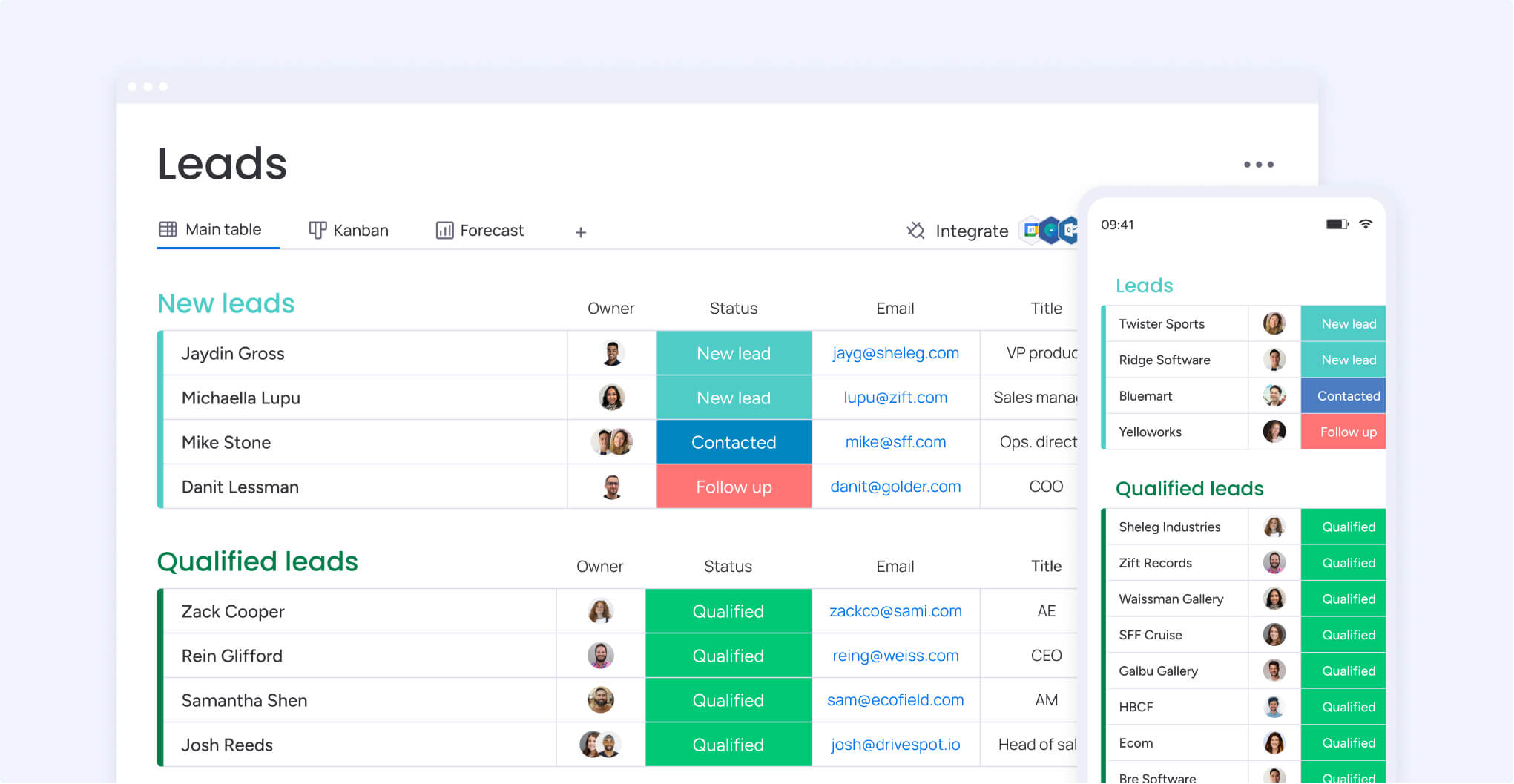
On monday CRM, you can collect and manage leads from different sources while AI helps you nurture them in the background. Send an automated follow-up email to each customer and get notified when leads open your messages and use AI to detect sentiment from call summaries and emails so you can prepare the best sales strategy.
Automate routine tasks to save time on admin work

monday CRM uses AI algorithms to help you build no-code smart automations instantly. Turn ideas from meetings into actionable tasks in just a couple clicks, create automations to assign new leads to reps based on specific parameters, and set reminders for important events or follow-ups with high-value prospects.
Get meaningful AI-powered insights and sales forecasts
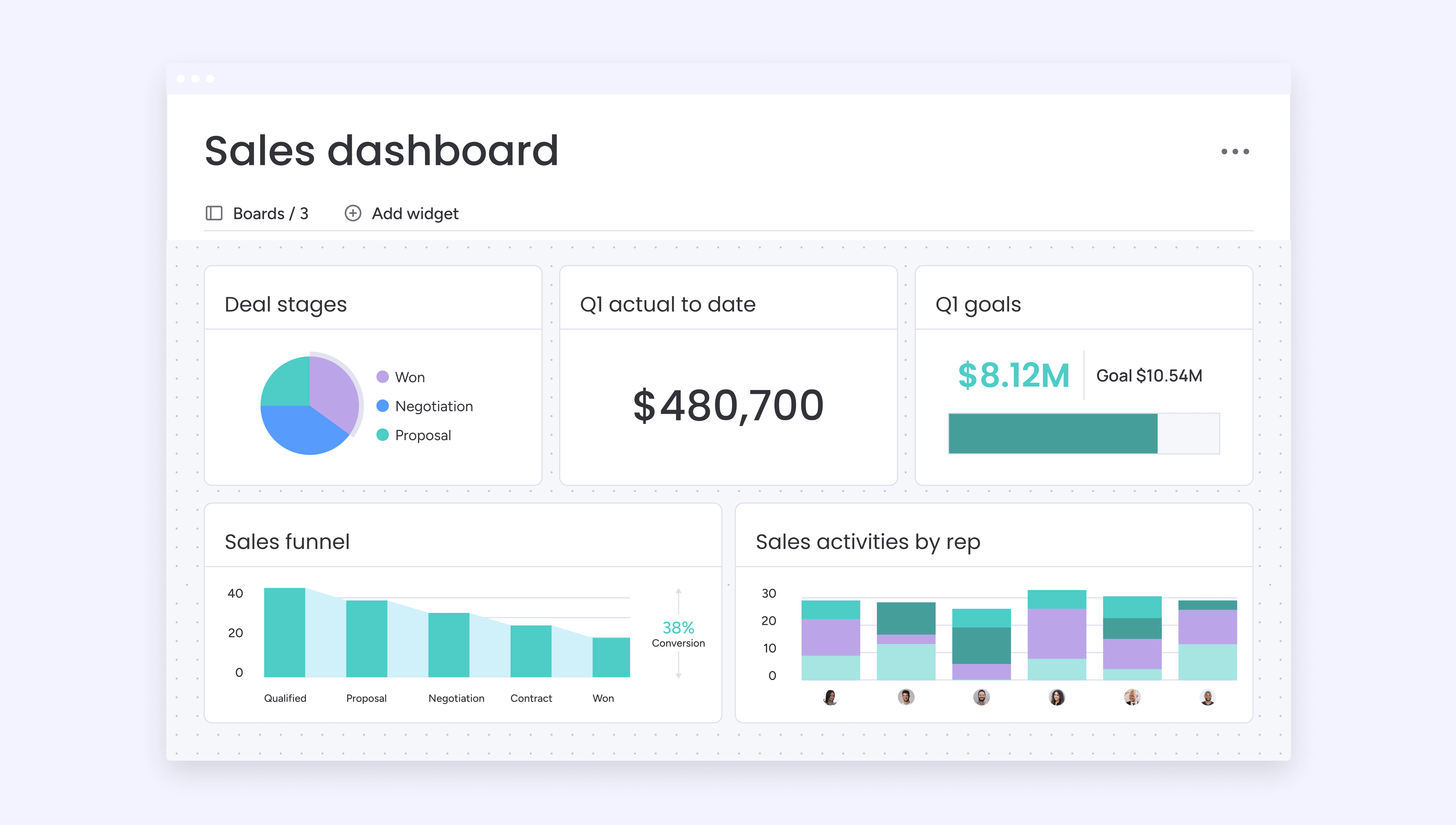
Any sales manager can stay on top of sales performance with visual dashboards and track individual agents, teams, and high-value deals in the pipeline. Using AI, you can generate reports, sales forecasts based on historical sales data, insights into customer behavior, and projected trends.
Try monday CRMProven examples of AI improving sales operations
It may seem intuitive to say you can use AI to automate workflows and improve communications, but what does this really look like in practice? To better understand the impact AI can have on sales departments, let’s look at two real-world success stories of companies that implemented AI platforms to improve sales operations.
Leading mobile company increases lead conversion rates by 50%
A leading telecom company implemented AI models to enhance its sales strategy, resulting in a 50% increase in lead conversion for its B2B segment. The company faced challenges such as an inconsistent sales pipeline, inefficient targeting for upselling and churn prevention, and relied on manual lead generation. Thanks to AI, the company was able to deploy AI-driven upsell models that identify tailored upgrade opportunities based on sales history and customer behavior. AI-powered churn prediction helped implement proactive retention and engagement strategies, while automated lead generation replaced ad-hoc, error-prone sales systems.
Velv boosts sales tracking by 60% with monday CRM
Velv, a leading nearshore software development company, enhanced its sales tracking by 60% and reduced unnecessary emails by 80% after implementing monday CRM. Previously, fragmented tools and manual processes led to inefficiencies, lost data, and communication gaps, limiting visibility and collaboration within the sales team. After implementing monday CRM, Velv centralized its sales pipeline and post-sales processes, allowing seamless access to data and cross-team coordination. Velv also used monday CRM to make strategic decisions and automate updates, resulting in improved client communication, faster response, and higher service quality.
Sales leaders - the future of AI for sales is already here
Even though some of the technologies are quite new, AI is already leaving its mark in the world of sales by making things easier for sales reps. Automated workflows, smart sales forecasting, enhanced customer interactions, and data-driven insights are all just the tip of the iceberg when it comes to AI’s capabilities in this space.
As AI continues to evolve, its role in sales will only expand, integrating more advanced natural language processing, real-time personalization, and deeper predictive capabilities. To stay ahead of competitors and meet increasing customer demands, it’s critical that sales teams adopt flexible AI platforms now, like monday CRM, so that they can seamlessly adapt to further changes as technology progresses.
FAQs
How can AI be used in B2B sales?
AI can enhance B2B sales by automating lead generation, improving sales forecasting, personalizing outreach, and analyzing customer data to identify high-value opportunities.
How can AI strengthen sales for local businesses?
AI helps local businesses by optimizing customer engagement through chatbots and personalized messaging, making it easier for smaller teams to keep customers engaged without maximizing resources and manpower.
What is the best sales AI tool?
The best AI sales platform for your business will depend on your needs, but popular options include CRMs like monday CRM, which offers plenty of AI features like no-code automations, advanced data analytics, lead tracking, and pipeline management.
What are generative AI tools for sales?
Generative AI tools like ChatGPT, Jasper, and Copy.ai assist in sales by creating personalized emails, generating sales scripts, and crafting engaging content for outreach and follow-ups. Certain platforms like monday CRM also have built-in generative AI capabilities that help sales teams compose emails, sales presentations, and other content all in one place.
Can AI make sales calls?
Yes, AI-powered voice assistants and conversational AI tools can make unassisted sales calls, qualify leads, and handle initial customer interactions. These tools use natural language processing (NLP) to engage prospects and streamline the sales process.
 Get started
Get started 
